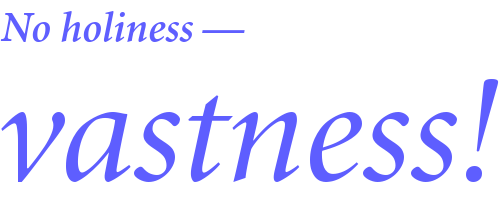
Almost every culture, religion, ideology, or world-view holds some things as sacred, pure, holy, or unquestionably true—and others as profane, unclean, or taboo.
Among the few exceptions are Zen and Dzogchen. They hold that there is nothing that is inherently sacred. (This ought to be an obvious consequence of the Heart Sutra—but most Buddhists do not see it that way.)
If you spend enough time with Zen or Dzogchen teachers, it is certain that they will at some point roast your sacred cows—whatever they are. They will contradict something you think every good person must believe. (That might be strongly-held political, religious, or cultural values.) Or they may do something you think no holy person ever should. (It might be a politically-incorrect joke, or eating meat, or ranting about how much they hate a kind of music you like.) They may violate fundamental assumptions you did not even know you had.
I think Bodhidharma, the founder of Zen, said it best. When the Emperor of China asked him a stupid question about holiness, he replied:

Any fixed belief, or fixed emotional response, is a “reference point.” We use reference points as bricks to build the prison of identity. In meditation, we allow that structure to collapse. When the roof falls in, we see the boundless sky. That is the vastness of nonduality, where purity and impurity are equally meaningless.
We also must be willing to notice and let go of reference points when not meditating. That includes being willing to have our lamas poke fun at things we thought were very serious.
nothing is sacred
everything is sacred
Because nothing is inherently sacred, anything and everything can be experienced as sacred. Snot is sacred. The city skyline is sacred. A half-crushed plastic soda bottle floating in the gutter is sacred.
This is a bigger, brighter view than we are used to. In every situation, we have the opportunity to experience awe and beauty. This view is also more accurate. In Dzogchen, it is called kadag, or “primordial purity.” All reality is “primordially” pure because purification is impossible and unnecessary. Nothing has ever been impure. We only created the illusion of impurity as a reference point, to avoid the vertigo of vastness.
Kadag automatically reveals itself as we practice Dzogchen meditation. Dzogchen trains us to see the world as it is, without reference points. In Dzogchen trek-chod, we experience the brilliant energy of emotions without their conceptual content. Those unnecessary emotional judgements are the basis for dividing the world into pure and impure, sacred and profane.
Experiencing the breakdown of this division is extremely funny. Dzogchen teachers ridicule every sacred cow, to let you in on the joke. They encourage reverence for every ordinary thing, to let you in on the joke.
Until you understand this, it is easy to be offended. Students attracted to Buddhism are, naturally, kind and thoughtful. It is common to assume that anyone kind and thoughtful would have mostly “politically correct” views—and that anyone with other views could not be kind or thoughtful. Politically correct views are entirely compatible with Dzogchen—but the belief that they are necessary or absolutely true is not.
